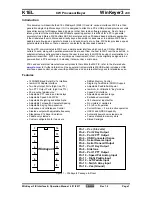
25
Adjusting the Proportional and Differential (P&D) Terms via RS-232 (PC Series only):
Type *@=A followed by “Enter” to stop the streaming mode of information.
To adjust the “P” or proportional term of the PID controller, type *R21 followed by “Enter”.
The computer will respond by reading the current value for register 21 between 0-65535. It is good
practice to write this value down so you can return to the factory settings if necessary. Enter the value
you wish to try by writing the new value to register 21. For example, if you wished to try a “P” term of
220, you would type *W21=
220
followed by “Enter” where the bold number denotes the new value.
The computer will respond to the new value by confirming that 21=220. To see the effect of the change
you may now poll the unit by typing A followed by “Enter”. This does an instantaneous poll and returns
the values once. You may type A “Enter” as many times as you like. Alternately, you could resume
streaming mode by typing *@=@ followed by “Enter”. Repeat step 3 to remove the unit from the
streaming mode.
To adjust the “D” or proportional term of the PID controller, type *R22 followed by “Enter”.
The computer will respond by reading the current value for register 22 between 0-65535. It is good
practice to write this value down so you can return to the factory settings if necessary. Enter the value
you wish to try by writing the new value to register 22. For example, if you wished to try a “D” term of
25, you would type *W22=
25
followed by “Enter” where the bold number denotes the new value.
The computer will respond to the new value by confirming that 22=25. To see the effect of the change
you may now poll the unit by typing A followed by “Enter”. This does an instantaneous poll and returns
the values once. You may type A “Enter” as many times as you like. Alternately you could resume
streaming mode by typing *@=@ followed by “Enter”. Repeat.
You may test your settings for a step change by changing the set-point. To do this type A32000 (A is the
default single unit address, if you have multiple addressed units on your RS-232 line the letter preceding
the value would change accordingly.) followed by “Enter” to give the unit a ½ full scale set-point. Monitor
the unit’s response to the step change to ensure it is satisfactory for your needs. Recall that the “P” term
controls how quickly the unit goes from one set-point to the next, and the “D” term controls how quickly
the signal begins to “decelerate” as it approaches the new set-point (controls the overshoot).
Summary of Contents for 16 Series
Page 32: ...32 P Series All standard ranges P Series Differential Pressure All standard ranges 2 3 0 ...
Page 33: ...33 PC Series All standard ranges PC Series Differential Pressure All standard ranges 2 ...
Page 34: ...34 0 PC3 Series All standard ranges PCR3 Series All standard ranges ...
Page 35: ...35 5 7 6 8 7 8 PCR Series Differential Pressure 5inH2O PCR Series Most standard ranges ...
Page 36: ...36 PCD Series All standard ranges PCD Series Differential Pressure All standard ranges ...
















































